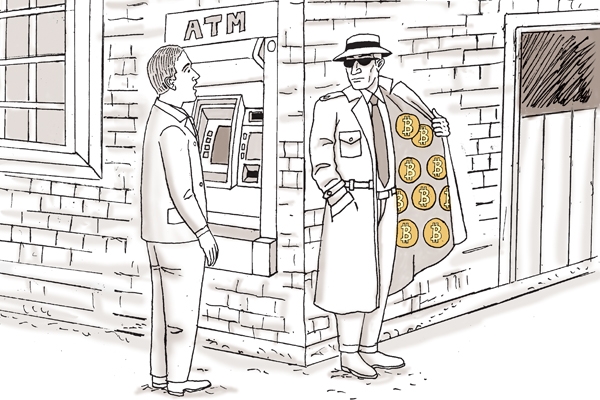Last time I was here (two weeks ago; how’ve you been?) I briefly mentioned Bitcoin, an emerging internet currency I didn’t understand at all but via which I had nonetheless made a bit of money (£57). Since then, I’ve been reading up and the whole thing has gone supernova, largely thanks to the extent that the EU is dicking around with real money in Cyprus. God, but I’m just bang on trend, aren’t I? Good old me.
So. The first thing you need to know about Bitcoin is that it’s a peer-to-peer, digitised crypto-currency. No, please, don’t stop reading. Just hold that one in your mind while we talk about the second and third things you need to know about Bitcoin, which are far more exciting. For example, you can buy drugs with it! I mean, sure, you can buy plenty of other stuff, too, but I’m really not sure anybody actually does. According to one study, Silk Road, the main ‘buy drugs with Bitcoin’ website, has a monthly turnover of around a million quid. And thirdly — you’ll like this one, you capitalist Spectator types — its value is rocketing. A month ago — out of interest, rather than a desire for heroin, Mum — I bought £100 of Bitcoin. Two weeks ago, like, I said, it was worth £157. Today, it’s worth £213. Interested yet?
Actually, the second and third things aren’t as important as I made out. Mnyeh, drugs, you can buy them anywhere. And, sure, Bitcoin is bullish at the moment, but the value notoriously bounces all over the place (in 2010 somebody spent 10,000 of them on a pizza, a sum which would today make that pizza worth £465,368). So, no, far more interesting than the drugs and riches is the core idea, which is this peer-to-peer crypto business. For the non-tech-savvy among us, this basically means it’s not quite like any other currency we’ll have ever used. It doesn’t have a central bank. Nobody is in charge. A Bitcoin is a thing that simply exists, like gold.
Of course, it’s not entirely like gold because it also, well, doesn’t. You don’t hold a Bitcoin in your hand. It’s a string of code, wibbling around in cyberspace. In theory, though, this does not — should not; probably might not — reduce the whole concept to a tenuous, fragile, corruptible Ponzi scheme. Exactly why is hard to get your head around, but it’s basically maths. A Bitcoin is a number, and you can’t just make up another number, because — bear with me here — there’s a limited number of those numbers. New ones have to be discovered, and only can be discovered at a certain rate. This can be lucrative, but also expensive, because you need a vast computer to do the data crunching. And, being peer-to-peer, the software that makes this all happen is everywhere. You couldn’t switch it off, anymore than you could the internet itself.
At least, that’s the idea. The whole thrust behind Bitcoin is that it removes the need for trust in currency; trust in bankers, trust in governments, trust that the two won’t collude to do you over, like they did with everybody in Cyprus. Whereas actually, because most of us can’t begin to understand the maths that all these very clever programmer types insist is at the heart of the whole project, I suspect the true alternative is just outsourcing your trust to them. Still, there are apparently a lot of programmer types, and everything they do is being scrutinised by other programmer types, because none of them have anything better to do, because they don’t have girlfriends. So I’m not sure that’s necessarily unwise. You might call it the morality of crowds. I think it’s the future.
Bitcoin is endlessly fascinating, in a conspiratorial sort of way. It was invented by somebody who called himself Satoshi Nakamoto (which was almost certainly a fake name) and then disappeared. Most likely he was a group of people, most of whom have probably profited quite nicely. But at heart, this was always a political project, rather than an economic one. Because the truly fascinating aspect of Bitcoin is not the thing itself (which may well get hacked one day, or otherwise collapse and fall apart) but the concept behind it.
Soon, whether via Bitcoin or whatever comes next, it will be possible to strip banking away from bankers, and money away from governments. Anecdotally, many suggest that the recent surges in Bitcoin value have had a lot to do with the seizing of bank accounts in Cyprus, with people in other wobbly eurozone banking systems (chiefly Spain) looking for a cheap and easy way to send their money somewhere else. Whether or not this is quite true (it could just be the result of hype, bollocks and credulous fools like me), Bitcoin is certainly a cheap and easy way to move money around the globe. And sure, when you buy them or sell them, traditional banking and taxation structures can get their claws into you. But what if you didn’t have to?
There’s a whole emerging political philosophy here, similar to the crypto-anarchism of the likes of Julian Assange. It’s about individuals having the power of governments; having their own secrets (the crypto part) that governments can’t crack. It’s appealing for any hardcore libertarian, but it’s going to have its costs. When democracy stops being about the group and becomes about the individual, and when you are literally empowered to pay and get paid without anybody knowing but you, what happens to the state that needs your taxes to survive?
Buggered if I know, but it’s probably bad. Still, at least I’m £113 up. Heroin all round.







Comments